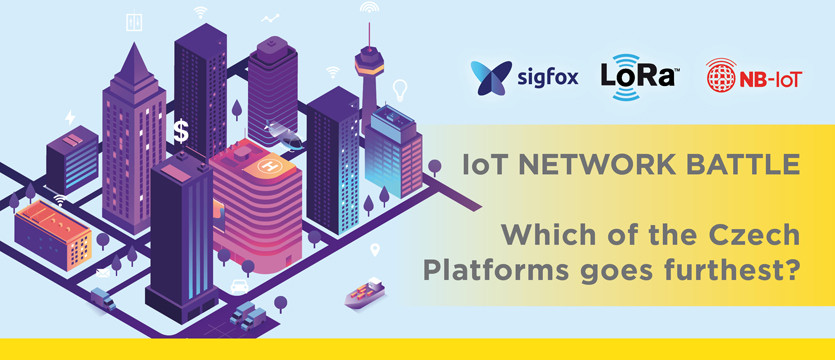IoT Network Battle
Additional information
Do you remember the time when you first accessed the Internet via a dial-up connection? After the screeching sounds from the phone line, you found yourself on Tiscali, Atlas, or Seznam and sent your first email to your friends. This scene took place in most Czech households some twenty-two years ago. Ten years later, the Internet allowed each of us to take part in the role of traditional media. All of a sudden everyone could tell the world what they thought about it, “to send”, not just “to receive”. Facebook, Youtube and Twitter were created and joined by Linkedin, Pinterest and Instagram. Today we are going to talk about a revolution that is raging right now. The Internet of Things (IoT) phenomenon.
As in previous cases, it would be foolish to think that this wave could be ignored. The wind in the sails is blowing the world’s largest companies, the world’s leading electronics manufacturers, urban planners planning smart cities, humanities scientists to address the concept of sustainable future development and the people themselves are looking for space for savings and comfort in their business or home.
However, the following lines will not be primarily about things that have an IP address – such as a TV, refrigerator, or thermostat. But especially about special data communication networks that enable the creation of data networks from sensors. That is, devices that usually do not need large power sources and send rather small amounts of data to the local cloud. The server then makes this data available to end users, for example, through a website or mobile application. A typical example is a system for reading electricity, water, heat usage, where the communication module automatically sends the current state at a predetermined time. The goal is wireless communication and at the same time minimalist battery power, which will enable the sensor to last for several years.
For the Internet of Things, a new type of LPWAN (Low Power Wide Area Network) has been developed that allows small amounts of data to be transferred between devices even over long distances. Sensors do not have an IP address but only a unique identifier. There are three protocols in the Czech Republic – Sigfox, which uses the T-Mobile network infrastructure; LoRa, which is used by Czech Radio-communications and NB-IoT (NarrowBand IoT) technology, behind O2 and Vodafone.
According to Jiří Konečný, which one is the furthest along today? “As part of the iNELS Air we have developed, we have bet on NB-IoT and our horse is running well so far. What still undermines his feet and hinders him is the more expensive price of radio-chips. But by providing the network to major mobile operators, they are able to offer advanced services and the certainty and responsibility of being on the wire whenever needed,” This is how it is described by one of the most outstanding personalities of Czech smart technologies and owner of the ELKO EP and iNELS companies.
‘’NarrowBand is also the network that has the greatest potential for further expansion. It provides two-way communication and is the only one to use the licensed LTE band. The advantage of NB-IoT is the use of the network already built, thus ensuring sufficient coverage both inside and outside buildings. This technology uses SIM cards in its devices, ”adds Jiří Konečný.
Among other things, the lifetime of SIM cards is a big topic among IoT technology manufacturers. “We verified this in cooperation with CleverFarm, when we needed to network large agricultural areas and then place sensors on them, which can evaluate the individual effects of weather on the crop. In the Czech Republic conditions, they are not so important, but in Ukraine, for example, there are really extreme frosts in winter, and in Saudi Arabia, in the summer, it is incredibly hot. Therefore, it is necessary to verify in advance whether the SIM cards will survive even in such conditions,” concludes Jiří Konečný.
Date of publication: 03. 03. 2020

 E-shop
E-shop